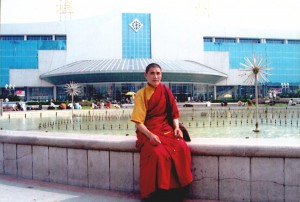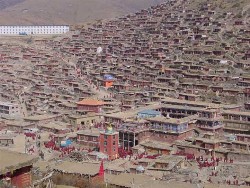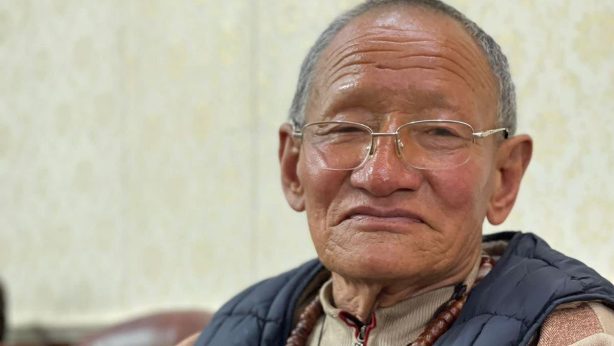Chinese court sentences Serthar monk to lengthy prison term

A Chinese Intermediate People’s court in Sichuan Province has sentenced a Tibetan monk, who remained incommunicado since his arrest in July 2008, to seven years in prison and deprivation of political rights for a year, according to confirmed information received by the Tibetan Centre for Human Rights and Democracy (TCHRD).
The Kardze Intermediate People’s Court in Sichuan Province had sentenced Ngagchung (only one name), 39-year-old monk of Larung Gar Buddhist Institute of Serthar, Sertha County, Kardze “Tibetan Autonomous Prefecture” (‘TAP’) to seven years in prison and deprivation of political rights for a year in January this year. There is no information on the exact date of the court trial, under what charges he was convicted or whether he was given any legal rights guarantee under the Chinese constitution and international laws.
The Centre questions the legality of such court sentence and urged the international communities to intervene in the unfair and arbitrary sentencing of Ngagchung, the trial which was held without the knowledge of his family members and failed to meet the minimal international judicial standards, required for a fair trial.
Ngagchung was arrested by the Public Security Bureau (PSB) officials on 8 July 2008 along with two other monks; Taphun and Gudrak of Larung Gar Buddhist Institute of Serthar on suspicion of leaking information about Tibet’s situation to the ‘separatist forces’ outside during the height of the Tibet protests in 2008. They were arrested by the security forces at Chengdu, during one of their trips in relation to the monastery’s duties at the provincial capital of Sichuan Province. Although Taphun and Gudrak-both brothers- were released after interrogation, Ngagchung continues to remain in detention at Chengdu PSB Detention Centre since his arrest. Every request made by the family to visit him were turned down. At present he is known to be incarcerated in a prison at a place called Ya’An, on the periphery of Chengdu city.

Ngagchung is a nephew of the late Khenpo Jigme Phuntsok, a highly-respected Tibetan Buddhist teacher who founded the Larung Gar Buddhist Institute in Sertha County (Ch: Seda), Kardze ‘TAP’. Ngagchung studied Buddhist philosophy at the Institute for more than 20 years. He has always been active in and respected by members of the institute.
Larung Gar Buddhist Institute in Sertha County witnessed numerous Chinese crackdowns in 1999 and April 2000 with Chinese authorities sending ‘work team’ officials to conduct the ‘Patriotic re-education’ campaign in the institute. Later, on 18 April 2001, the Chinese authorities imposed a quota on the number of students who could attend the institution. Some 7,000 students were forced to leave. Then in June 2001 fifty trucks and jeeps arrived at the Institute and, under the protection of thousands of security officials who camped on the outskirts of the Institute tore down the monastic homes. The founder of the institute, Khenpo Jigme Phuntsok, passed away under mysterious circumstance at a hospital in Chengdu on 7 January 2004 at the age of 70.
The Centre considers the right to a fair trial as a basic human right and every Tibetan should be guaranteed this right as enshrined in the Chinese constitution and major international covenants to which China is party to. The right to a fair trial is one of the universally applicable principles recognized in the Universal Declaration of Human Rights adopted by the UN in 1948 and still the cornerstone of the international human rights system. The right to a fair trial has been reaffirmed and elaborated since 1948 in legally binding treaties such as the International Covenant on Civil and Political Rights, and in numerous other international and regional treaties and non-treaty standards, adopted by the UN and by regional intergovernmental bodies.


